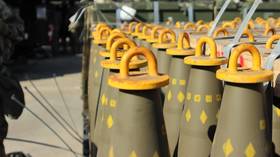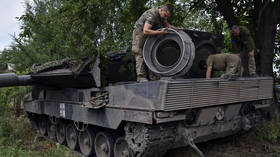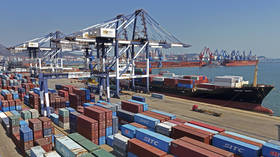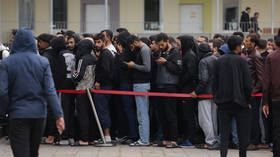Cluster bombs ‘useful’ for Ukraine – Pentagon

The Pentagon says Ukraine would benefit from US-supplied cluster munitions, claiming they would be effective against Russian fortifications as Kiev presses ahead with its counteroffensive.
Appearing before a House Foreign Affairs subcommittee hearing on Thursday, Pentagon deputy Laura Cooper was asked whether 155-millimeter cluster bombs could help Ukraine to offset Russia’s “quantitative advantage in manpower, armor and artillery.”
“Our military analysts have confirmed that DPICMs would be useful especially against dug-in Russian positions on the battlefield,” Cooper said, referring to the cluster weapons by their formal name, Dual-Purpose Improved Conventional Munitions.
She added that the White House has been unable to meet Kiev’s repeated requests for the bombs due to “existing congressional restrictions” and “concerns about allied unity.”
Cluster bombs carry smaller explosive submunitions which are released in flight and scattered across a target area, typically used against personnel and lightly armored vehicles. However, due to their tendency to leave behind undetonated ‘duds’ – which can remain live in former conflict zones for decades – more than 120 nations have agreed to ban the weapon, including most NATO members.
While Washington has not joined the international Convention on Cluster Munitions, Congress passed a law in 2009 which prohibited exports of any cluster bombs with a ‘dud’ rate of more than 1%, which applies to most of the US stockpile. Though the measure effectively bans all foreign transfers of the weapon, President Joe Biden can waive the restriction at any time.
Several Republican lawmakers have urged the White House to do just that, with a group of GOP congressmen and senators telling Biden in March to ignore “vague concerns about the reaction of allies and partners and unfounded fears of ‘escalation.’” Democrats have been less vocal about the issue, but some prominent party members have said the weapons should not be ruled out.
US officials have said they are not “actively considering” sending cluster bombs to Kiev, but President Biden has reversed course on several occasions after declining to provide certain systems, such as the M1 Abrams main battle tank and the Patriot missile defense platform.
Moscow has warned that the supply of foreign arms to Kiev will only prolong the conflict while doing little to deter its military objectives. Responding to earlier calls for cluster munitions, Deputy Foreign Minister Sergey Ryabkov said the move would mark a major escalation by Washington and only serve to undermine the security of the NATO bloc.














